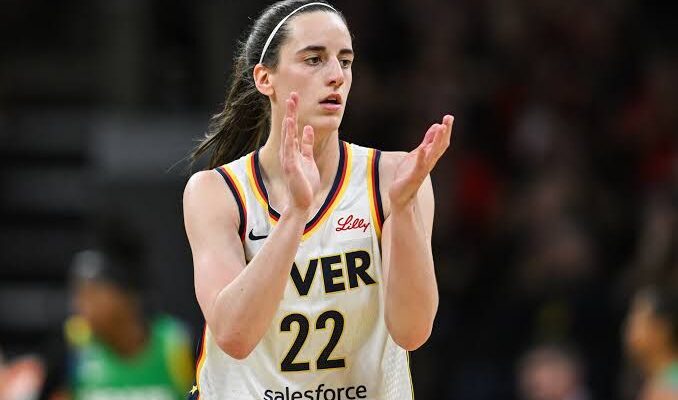Caitlin Clark: The Modern Echo of Magic Johnson, Larry Bird, and Michael Jordan
In the history of sports, a rare echelon of athletes transcends their individual greatness to redefine what it means to play the game. They are more than scorers, more than winners—they are transformers. They alter the DNA of the teams they play on. They make others around them shine. They uplift, elevate, and empower. Magic Johnson, Larry Bird, and Michael Jordan were such players. And today, in the world of basketball—men’s or women’s—perhaps no one embodies that spirit more closely than Caitlin Clark.
The notion that Caitlin Clark resembles Magic, Bird, and Jordan might, on the surface, seem like hyperbole. After all, those three names are not just icons—they are legends whose careers defined the NBA and global basketball. But when you watch Caitlin Clark play, when you examine her impact on the game, the culture, and her teammates, the comparisons not only become valid—they become inevitable.
Magic Johnson was a maestro. Standing 6’9” and playing point guard with the elegance of a ballet dancer and the strength of a forward, he redefined what a “floor general” could be. He smiled as he played, not because the game was easy, but because it was joyous.
Caitlin Clark exudes the same joy. Watch her pull up from the logo, whip a no-look pass, or ignite a fast break with a full-court outlet and you see the essence of Magic. Like Magic, Caitlin is a playmaker at heart. Her passing is not just efficient—it’s electric. She sees the court like a chessboard and plays three steps ahead. Her teammates are often the greatest beneficiaries of her brilliance. They cut harder, run faster, shoot more confidently—not because their skills change overnight, but because she sets them up to succeed. That’s Magic’s legacy, and it lives in Clark.
Statistically, Clark’s assist numbers are staggering. She routinely averages double-digit assists, many of which come from dazzling, high-risk, high-reward plays that only a few dare to attempt. And she does this while being the most heavily guarded player on the court. Like Magic, she combines flair with fundamentals, creativity with control. And like Magic, her style is infectious. Her teammates often reflect her energy and tempo. She doesn’t just pass the ball—she transfers belief.
Larry Bird wasn’t the fastest, wasn’t the tallest, and wasn’t the most athletic. But he was arguably the smartest player on the court—always. Bird’s genius lay in his ability to understand the game at a level few could match. He could shoot, pass, rebound, and defend with a ferocious edge masked behind a calm demeanor. He was intensely competitive, often using his mind as much as his body to dismantle opponents.
Caitlin Clark has Bird’s versatility. She scores from anywhere—midrange, deep three, transition, set plays. She rebounds with tenacity, initiates offense, and defends with grit. She’s not a one-dimensional scorer; she’s a multi-tool weapon. But more than that, she has Bird’s edge—the quiet, cerebral confidence that allows her to take over a game without ever looking rattled.
And like Bird, Clark can back up the talk. Whether it’s delivering a dagger three in crunch time or threading a pass through a double-team, she has the poise and confidence that turns pressure into performance. Bird famously told defenders exactly how he would beat them—and then did it. Clark brings that same kind of swagger. It’s not arrogance; it’s assurance. She knows what she can do, and she’s not afraid to show it.
Moreover, Bird’s leadership was rooted in trust. He played to win, but he also played with his teammates, never above them. Clark has that same ethos. She doesn’t seek to outshine her teammates—she enhances them. That’s not just a trait of a great player. That’s the mark of a great leader.
Michael Jordan wasn’t just the best player on the floor—he was a killer. His competitiveness was legendary. His presence altered the course of games and careers. When Jordan stepped on the court, the energy shifted. He didn’t just want to win; he wanted to dominate. He created moments—game-winners, poster dunks, impossible comebacks—that became mythology.
Caitlin Clark is building a similar reel of iconic moments. Her deep threes have become signature plays, but her clutch performances are where her Jordan DNA is most evident. Game after game, she rises to the occasion. Whether it’s leading a comeback, taking the final shot, or making the crucial pass, she wants the ball in the defining moments.
Jordan’s greatness was amplified by the big stage—and so is Clark’s. In the NCAA Tournament, her performances drew record viewership, and she rose to the occasion every time. Her basketball IQ, her drive, and her refusal to wilt under pressure make her a singular force in the game. Like Jordan, she doesn’t just play in the moment—she defines it
The most powerful testament to Clark’s greatness is this: she makes everyone around her better. That was true of Magic. That was true of Bird. That was true of Jordan in his later years. Clark brings out the best in her teammates not only through her assists and passing vision but by elevating their confidence. Teammates take smarter shots because she puts them in rhythm. They play with more passion because she sets the tone. They rise to the challenge because she leads the charge.
At Iowa, Clark turned a solid program into a national powerhouse. She broke records, yes—but her teammates flourished too. Players who might not have been household names became stars in their own right. Why? Because playing with Clark gives you more than a stat boost. It gives you belief.
Her ability to do this—consistently and across different contexts—proves that her impact isn’t just statistical. It’s emotional. Cultural. Transformational. Like the legends before her, she brings a gravitational force to the court. She doesn’t just play basketball; she moves basketball.
Magic, Bird, and Jordan didn’t just shape basketball—they helped shape pop culture. They brought people to the game who had never cared about it before. They made basketball cool. They made it global.
Clark is doing the same for women’s basketball. Her games are appointment viewing. Fans are filling arenas not just in Iowa, but across the country, to watch her play. Kids wear her jersey. Social media buzzes with her highlights. She’s not just a player—she’s a phenomenon.
Her presence has already shifted the economics of women’s basketball. Ticket sales, viewership numbers, NIL deals—her influence is measurable in dollars and data. But it’s also seen in the faces of young fans who now dream of being the next Caitlin Clark. That’s legacy. That’s impact. That’s Jordan-level influence.
And importantly, she’s doing it with grace. She’s a fierce competitor, yes, but she’s also accessible, humble, and articulate. She understands the platform she’s built and uses it to promote the game, her teammates, and the next generation of players. In this way, she may be even more valuable than her predecessors—because she’s doing it in a time when visibility and representation matter more than ever.
Caitlin Clark is not a carbon copy of Magic Johnson, Larry Bird, or Michael Jordan. No one is. But she carries their spirit. She blends Magic’s vision, Bird’s intelligence, and Jordan’s fire into a singular force that is reshaping the landscape of basketball.
She is a bridge between eras—between the past and the future of the sport. She honors the traditions of team play, hard work, and competitive excellence while pushing the game forward with style, flair, and innovation.
More than anything, she makes her team look amazing. That’s not a statistic—it’s a superpower. And it’s the clearest sign that we are witnessing something special. Something familiar. Something legendary.
We are not watching the next Magic, Bird, or Jordan. We are watching the first Caitlin Clark. And that might be even more extraordinary.
Let me know if you’d like this adapted for a speech, an op-ed, or with citations for publication.



